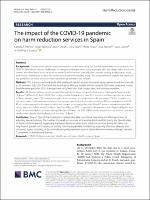| dc.contributor | Departament de Salut |
| dc.contributor.author | Picchio, Camila Andrea |
| dc.contributor.author | Valencia, Jorge |
| dc.contributor.author | Doran, Jason |
| dc.contributor.author | Swan, Tracy |
| dc.contributor.author | Pastor, Marta |
| dc.contributor.author | Martró, Elisa |
| dc.contributor.author | Colom-Farran, Joan |
| dc.contributor.author | Lazarus, Jeffrey V |
| dc.date.accessioned | 2022-02-03T12:42:38Z |
| dc.date.available | 2022-02-03T12:42:38Z |
| dc.date.issued | 2020-11-04 |
| dc.identifier.citation | Picchio CA, Valencia J, Doran J, Swan T, Pastor M, Martró E, Colom J, Lazarus JV. The impact of the COVID-19 pandemic on harm reduction services in Spain. Harm Reduct J. 2020 Nov 4;17(1):87. |
| dc.identifier.uri | https://hdl.handle.net/11351/6963 |
| dc.description | COVID-19; Harm reduction; Health systems; Healthcare utilisation |
| dc.description.abstract | Background: Containment policies and other restrictions introduced by the Spanish government in response to the COVID-19 pandemic present challenges for marginalised populations, such as people who use drugs. Harm reduction centres are often linked to social services, mental health services, and infectious disease testing, in addition to tools and services that help to reduce the harms associated with injecting drugs. This study aimed to explore the impact of the pandemic on these services in four autonomous communities in Spain.
Methods: This is a cross-sectional study that employed a seven-section structured survey administered electronically to 20 centres in July 2020. Data from the most heavily affected months (March-June) in 2020 were compared to data from the same period in 2019. Averages were calculated with their ranges, rates, and absolute numbers.
Results: All 11 responding centres reported having had to adapt or modify their services during the Spanish state of alarm (14 March-21 June 2020). One centre reported complete closure for 2 months and four reported increases in their operating hours. The average number of service users across all centres decreased by 22% in comparison to the same period in the previous year and the average needle distribution decreased by 40% in comparison to 2019. Most centres reported a decrease in infectious disease testing rates (hepatitis B and C viruses, human immunodeficiency virus, and tuberculosis) for March, April, and May in 2020 compared to the previous year. Reported deaths as a result of overdose did not increase during the state of alarm, but 2/11 (18%) centres reported an increase in overdose deaths immediately after finalisation of the state of alarm.
Conclusion: Overall, Spanish harm reduction centres were able to continue operating and offering services by adjusting operating hours. The number of overall service users and needles distributed fell during the Spanish state of alarm lockdown period, suggesting that fewer clients accessed harm reduction services during this time, putting them at greater risk of reusing or sharing injecting equipment, overdosing, acquiring infectious diseases with decreased access to testing or discontinuing ongoing treatment such as methadone maintenance therapy, hepatitis C treatment, or antiretroviral therapy. |
| dc.language.iso | eng |
| dc.publisher | BMC |
| dc.relation.ispartofseries | Harm Reduction Journal;17 |
| dc.rights | Attribution 4.0 International |
| dc.rights.uri | http://creativecommons.org/licenses/by/4.0/ |
| dc.source | Scientia |
| dc.subject | COVID-19 (Malaltia) |
| dc.subject | Drogoaddicció - Assistència sanitària - Espanya |
| dc.subject.mesh | Coronavirus Infections |
| dc.subject.mesh | Substance-Related Disorders |
| dc.subject.mesh | Harm Reduction |
| dc.subject.mesh | Spain |
| dc.title | The impact of the COVID-19 pandemic on harm reduction services in Spain |
| dc.type | info:eu-repo/semantics/article |
| dc.identifier.doi | 10.1186/s12954-020-00432-w |
| dc.subject.decs | infecciones por Coronavirus |
| dc.subject.decs | trastornos relacionados con sustancias |
| dc.subject.decs | reducción de daños |
| dc.subject.decs | España |
| dc.relation.publishversion | https://doi.org/10.1186/s12954-020-00432-w |
| dc.type.version | info:eu-repo/semantics/publishedVersion |
| dc.audience | Professionals |
| dc.contributor.authoraffiliation | [Picchio CA] Barcelona Institute for Global Health (ISGlobal), Hospital Clínic, University of Barcelona, Barcelona, Spain. [Valencia J] Unidad Móvil de Reducción del Daño SMASD, Madrid, Spain. [Doran J] Faculty of Public Health and Policy, London School of Hygiene and Tropical Medicine, London, UK. [Pastor M] Comisión Ciudadana Antisida de Bizkaia, Bilbao, Spain. [Martó E] Microbiology Department, Laboratori Clínic Metropolitana Nord, Hospital Universitari Germans Trias i Pujol, Institut D'Investigació en Ciències de La Salut Germans Trias i Pujol (IGTP), Badalona, Spain. Centro de Investigación Biomédica en Red en Epidemiología Y Salud Pública (CIBERESP), Instituto de Salud Carlos III, Madrid, Spain. [Colom J] Programa d’Abús de Substàncies i de Prevenció, Control i Tractament del VIH, ITS i Hepatitis Viral, Agència de Salut Pública de Catalunya, Departament de Salut, Generalitat de Catalunya, Barcelona, Espanya. [Lazarus JV] Barcelona Institute for Global Health (ISGlobal), Hospital Clínic, University of Barcelona, Barcelona, Spain |
| dc.identifier.pmid | 33143699 |
| dc.rights.accessrights | info:eu-repo/semantics/openAccess |

